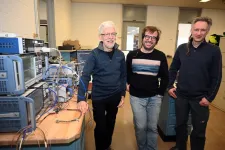(Press-News.org) New Haven, Conn. — The constant evolution of new COVID-19 variants makes it critical for clinicians to have multiple therapies in their arsenal for treating drug-resistant infections. Researchers have now discovered that a new class of oral drugs that acts directly on human cells can inhibit a diverse range of pathogenic SARS-CoV-2 strains.
In their newly published study, the team found a novel mechanism through which the gene that expresses angiotensin converting enzyme-2 (ACE-2)—the cellular receptor to which SARS-CoV-2 binds so that it can enter and infect the cell—is turned on. They also found that a class of oral drugs currently in human clinical trials can block this pathway and potentially be a therapeutic for all SARS-CoV-2 variants, as well as any newly emerging SARS-like viruses. The team published its findings in Nature Genetics on March 8..
“Because of drug-resistant variants, we’re down to only one drug, Paxlovid, as far as our oral options,” says Craig Wilen, MD, PhD, associate professor of laboratory medicine and of immunobiology, and a member of Yale Cancer Center. “Targeting these master regulatory complexes complements existing approaches and fills a need for a new drug class that can be exploited to help combat drug resistance and infection.” Wilen and Cigall Kadoch, PhD, of Dana-Farber Cancer Institute, were co-senior authors of the study.
Researchers Identify mSWI/SNF Complexes and as Potential Anti-Viral Targets
In a previous study published in 2021, Wilen’s team at Yale performed genetic screening to identify host factors that are essential for SARS-CoV-2 infection. One of the key players was the mammalian switch/sucrose non-fermentable (mSWI/SNF, also called BAF) chromatin remodeling complex, a group of over a dozen very conserved proteins that allow certain genes to turn on.
“At that point, I’d never heard of it in the setting of virus infection, and we couldn’t understand why it was important for coronaviruses,” says Wilen. Thus, the group teamed up with experts on this complex, the Kadoch Lab at the Dana-Farber Cancer Institute and Harvard Medical School to find out how the protein complex acts to make cells susceptible to infection and if newly emerging drugs against these complexes could stunt viral infection.
At the time they embarked on their collaborative work, the U.S. Food and Drug Administration had authorized six monoclonal antibody treatments for emergency use, yet none of these treatments work against the newest Omicron variants. This leaves clinicians with remdesivir, which can only be administered through an IV, limiting its use; molnupiravir, an oral drug that works similarly to remdesivir but only has 30 percent efficacy; and Paxlovid, an oral antiviral that works through inhibiting the viral protease. Paxlovid, Wilen says, is the mainstay of current treatment.
“It’s a great drug that works well, but there has been some emerging drug resistance to it,” he says. “And currently, that is the only drug in our toolbox that we can give as an oral form.” The dwindling of effective treatments further highlights the critical need for a new class of drugs to add to the toolbox, and ideally, ones that are less susceptible to quick-acting resistance mechanisms.
Blocking mSWI/SNF Protects Cells Against SARS-CoV-2
First, the team discovered that disrupting mSWI/SNF complexes prevented viral entry into human cells. Because mSWI/SNF is known to regulate genes turning on and off, they then hypothesized that it might also play a role in activating the ACE-2 receptor. Next, they uncovered its mechanism: mSWI/SNF binds to another protein called HNF1A, a transcription factor, which directs it to the gene that encodes ACE-2. Upon disrupting mSWI/SNF complexes, the cell could no longer make ACE-2 and became resistant to infection by any virus that uses that receptor. This includes many coronaviruses.
Small molecule inhibitors that target mSWI/SNF have already been developed by Kadoch-founded Foghorn Therapeutics and are in phase I clinical trials as a therapeutic for several cancers. Wilen and Kadoch found that this class of drugs was effective against multiple variants of SARS-CoV-2—including a remdesivir-resistant strain isolated from a Yale patient—without any adverse effects on the cell. “This is proof of principle that this can be a really important first- or second-line tool to combat drug resistance,” says Wilen.
“Further, this speaks to the wide, multi-disease potential for pharmacologic modulation of chromatin remodeling complexes,” says Kadoch. “These molecular machines sit at the top of the pyramid in governing gene expression programs that go awry in many different human diseases—we are just at the tip of the iceberg in identifying and exploring their utility”.
Wilen believes the drugs in these clinical trials can potentially be repurposed to inhibit both current and future coronaviruses. Furthermore, Wilen and Kadoch hope the work can provide insight into why certain people and specific cell types may be more susceptible to coronavirus than others. “Future work is needed to look at the underlying biology of why some people are asymptomatic while others experience severe infection and death,” Wilen says.
COVID-19 will not be the last severe viral outbreak. Wilen’s lab studies coronaviruses circulating in wild bats, which he believes pose the highest risk for infecting humans and causing the next pandemic. Many of these viruses use ACE-2 as a receptor, which means that this new study may hold the key to slowing or stopping the next outbreak. “We’re going to have another pandemic, whether it’s in a few years or a decade. And we’re underprepared for it,” he says. “The best way to prepare is to have as many vaccines and drugs as possible ready to go so that we can combat the outbreak early with maximum effectiveness.”
END
A new class of drugs could prevent resistant COVID-19 variants, study finds
2023-03-08
ELSE PRESS RELEASES FROM THIS DATE:
Swan Hellenic and SETI Institute announce lecturers for Explore Space at Sea Series
2023-03-08
March 8, 2023, Mountain View, CA – The SETI Institute and Swan Hellenic announce SETI Institute guest lecturers who will offer cruise guests expert insights into the history and latest discoveries in astronomy, astrophysics, astrobiology and planetary science, and the quest to find other forms of life within and beyond our solar system. This quest takes SETI Institute researchers to the planet’s most remote and inhospitable corners to explore life, including Antarctica, where the Swan Hellenic fleet is present for several months every year.
Outlining ...
New articles for Geosphere posted early online
2023-03-08
Boulder, Colo., USA: GSA’s dynamic online journal, Geosphere, posts articles online regularly. Topics this month include an analysis of geoscience job applications; Uturuncu volcano, Bolivia; Picture Gorge Basalt; and the Red Bluff Granite Suite. You can find these articles at https://geosphere.geoscienceworld.org/content/early/recent .
Critical workforce skills for bachelor-level geoscientists: An analysis of geoscience job advertisements
G.W. Shafer; K. Viskupic; A.E. Egger
Understanding the skills ...
Human Brain Project: spin-off receives EIC grant to develop energy-efficient AI technology
2023-03-08
The European Innovation Council (EIC) has recently announced that it will award a Transition grant to SpiNNcloud Systems GmbH, a deep-tech startup based in Saxony, Germany.
The team from SpiNNcloud Systems GmbH, a spin-off from Professor Christian Mayr’s research group at Technische Universität Dresden, is receiving a grant of 2.5 million euros for their groundbreaking project, “SpiNNode: SpiNNaker2 on the edge.”
“SpiNNaker2 is a bio-inspired supercomputer which was developed at my Chair in collaboration with Prof. Steve Furber’s research group at the University of Manchester as part ...
New GSA Bulletin articles published online ahead of print
2023-03-08
Boulder, Colo., USA: The Geological Society of America regularly publishes articles online ahead of print. GSA Bulletin topics studied this month include the nature and dynamics of China and Tibet; the Lower Mississippi Valley, USA; and the polarity of Mesozoic arcs along the western margin of North America. You can find these articles at https://bulletin.geoscienceworld.org/content/early/recent .
Magmatic-hydrothermal evolution of long-lived Nb-Ta-(Sn) mineralization in Lianyunshan, NE Hunan, South China
Nuerkanati Madayipu; Huan Li; Safiyanu Muhammad Elatikpo; Michael W. Förster; Hou-Xiang Zhou ...
The ...
Group exercise program for older adults led to more independent exercise despite pandemic restrictions, MU study finds
2023-03-08
COLUMBIA, Mo. -- Sticking with an exercise program can be tough, even during the best of times. But what about during a pandemic?
A new study by the University of Missouri and Oklahoma State University found that even when gyms were closed and there were other COVID-19 restrictions limiting face-to-face meetings, older adults who completed the Stay Strong, Stay Healthy exercise program — created at MU in 2005 — continued to maintain long-term exercise habits independently, which resulted in improved lifestyle changes and an increase in both physical energy and self-confidence.
“We ...
Incident atrial fibrillation appears to heighten dementia risk
2023-03-08
People with a recent diagnosis of atrial fibrillation (AF), the most common irregular heart rhythm, have a modestly higher risk of developing dementia than people without the condition, according to research published today.
“Previous studies that have examined the link between atrial fibrillation and dementia have yielded conflicting results, and we hope that our study’s large sample size helps to establish confidence in our findings,” said Dr. Nisha Bansal, a professor of medicine at the University of Washington School of Medicine. “The study also included a community based, diverse population, which may increase the generalizability ...
Lunar telescope will search for ancient radio waves
2023-03-08
UPTON, NY—Scientists at the U.S. Department of Energy’s (DOE) Brookhaven National Laboratory are leading a new effort to land a radio telescope on the moon. If successful, the project will mark the first step towards exploring the Dark Ages of the universe.
The Dark Ages are an early era of cosmological history starting about 380,000 years after the Big Bang. There were no stars or planets in the Dark Ages. It’s a point in time that scientists have never been able to observe. Though radio waves from the Dark Ages still linger in space, the abundance of radio interference on Earth has masked these signals from scientists seeking to study them.
If ...
How a metabolite causes inflammation and disease
2023-03-08
A new study shows for the first time a connection between a mitochondrial metabolite and the activation of an inflammatory response. Mitochondria are functional units of our cells that fulfil important tasks, i.e. chemical reactions, for the functioning of the cell. One of these tasks is the production of energy that is necessary for cell growth and reproduction. If certain chemical reactions in the mitochondrion change, diseases occur. For example, deficiencies in fumarate hydratase (FH) in the Krebs cycle, one of the most important metabolic pathways in mitochondria, ...
'Other' race/ethnicity linked to higher suicide and overdose risk in military members with mild TBI
2023-03-08
March 8, 2023 – Previous studies have reported high rates of death by suicide and drug overdose – including opioid overdose – in military service members with a history of mild traumatic brain injury (mTBI). A new study finds that those risks are highest among military members with mTBI who identify their racial/ethnic status as "Other," as opposed to standard racial/ethnic categories, reports the March/April issue of the Journal of Head Trauma Rehabilitation (JHTR). The official journal of the Brain Injury Association of America, JHTR is ...
Cancer Grand Challenges announces global research funding opportunity with nine new challenges
2023-03-08
The National Cancer Institute (NCI), part of the National Institutes of Health, and Cancer Research UK have announced nine new research challenges aimed at tackling some of the most profound problems in cancer research. The global funding opportunity is part of the Cancer Grand Challenges program, an initiative launched by NCI and Cancer Research UK in 2020.
The research initiative aims to inspire bold new ideas that have the greatest potential for advancing cancer research and improving outcomes for people affected by cancer. The new round of challenges, announced March 8, 2023, during the Cancer Grand Challenges Annual Scientific Summit in London, is open until June ...


